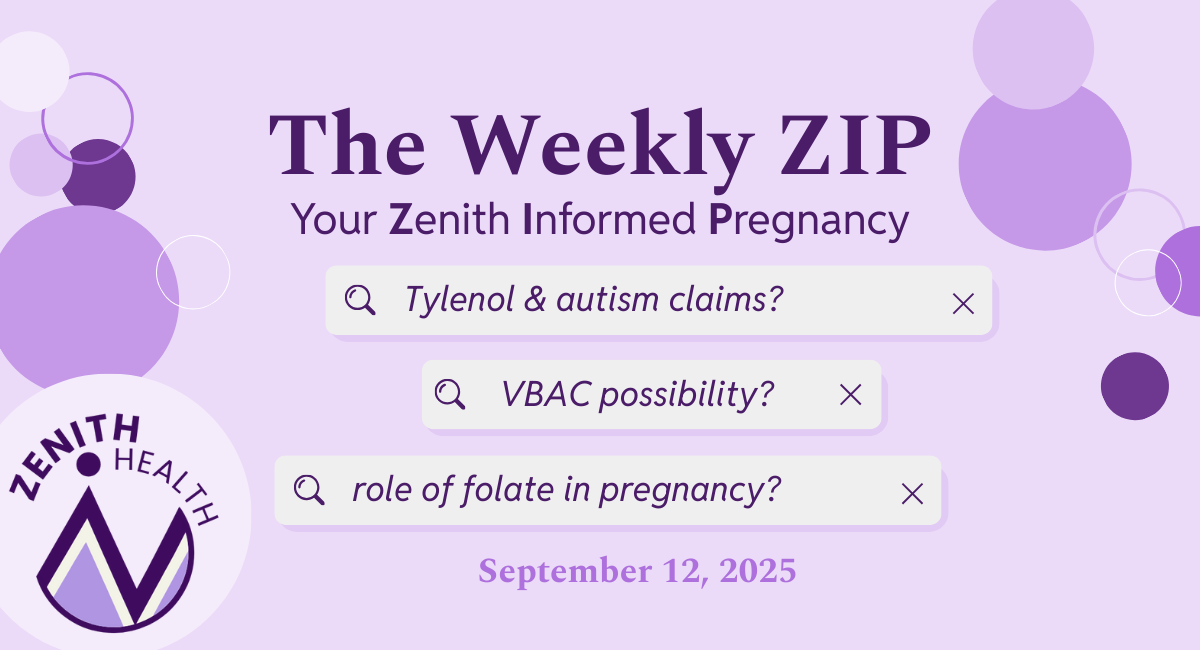
Welcome to the weekly ZIP - your Zenith Informed Pregnancy!
Read on for a quick zip through 3 of the week’s most popular pregnancy questions, and the evidence behind them. Plus - bonus content on the latest & greatest in the world of pregnancy research.
This week's top pregnancy questions:
1️⃣ Does Tylenol during pregnancy cause autism?
2️⃣ Why is folate important?
3️⃣ How can I know if a VBAC is possible for me?
Does Tylenol during pregnancy cause autism?
Last Friday’s headline that RFK Jr. and the HHS are expected to release a report linking Tylenol use during pregnancy to autism made big waves amongst pregnant people, doctors, and researchers alike. Given that Tylenol has been the most commonly used pain and fever relief for pregnant women, the headlines left many wondering what to do.
📚The tl;dr from the evidence: The best available evidence we have today does not suggest any causal relationship between taking Tylenol during pregnancy and autism.
One of the most important and robust studies on this topic looked at nearly 2.5 million births, and compared siblings born to the same mother - when one pregnancy had Tylenol exposure and another didn't. When researchers did this, the association between Tylenol and autism essentially went away - suggesting that familial factors may be more important than Tylenol exposure.
So why all the controversy? In short, a number of studies do indicate a small association between Tylenol use and autism – but they don’t fully control for other context or influences on autism risk (scientifically, called “confounding factors”). Think of it this way: people take Tylenol for a reason (fever, illness, pain). Those same underlying factors could also influence autism risk, making it difficult to isolate just the impact of the Tylenol.
👀Read Penny’s full summary of the evidence for more on the association of autism with Tylenol use
Why is folate important?
Folate also made the headlines this week – with the HHS report expected to suggest two things: that folate deficiencies during pregnancy may contribute to autism, and that a specific form (called folinic acid) could help treat autism symptoms. Understandably, this sparked renewed questions about folate during pregnancy.
📚The tl;dr from the evidence: Folate, or vitamin B9, is well studied and known to be highly important during pregnancy. However, folinic acid, also known as leucovorin (the potential treatment referenced) isn't actually the same as folic acid (what's in your prenatal vitamin). Nerd alert: we’ve got you covered to learn the distinction!
The evidence on supplementing with folic acid during pregnancy is very strong. Randomized controlled trials, widely considered to be the gold standard of research (despite being relatively uncommon in pregnancy), have shown that folic acid supplementation before and during pregnancy significantly reduces the risk of neural tube defects – serious birth defects of the spine and brain.
Beyond lowering the risk of birth defects, folate also fuels healthy cell growth (a pretty big deal when cells are dividing rapidly enough to build a human!) and red blood cell production.
👀Read Penny’s full summary of the evidence for more on folate
How can I know if a VBAC is possible for me?
September and October moms are in labor & delivery planning mode right now, and for those with previous C-sections, a common question is coming up: will a vaginal birth be possible this time around?
📚The tl;dr from the evidence: The main factors that determine the likelihood of successful VBAC (and thus, who is generally considered to be a good candidate) are the type of prior incision, the number of prior C-sections and/or vaginal deliveries, reasons for prior C-section(s), and any current pregnancy risk factors.
For good candidates based on these factors, evidence shows the overall success rate of vaginal delivery as ~60-80%, while some women may attempt a VBAC but end up needing a repeat C-section as labor progresses – which is a completely normal (and safe) option.
👀Read Penny’s full summary of the evidence for more on VBACs and when they’re most likely to be successful
🤓 Zenith's top read of the week
Bonus: what the Zenith team found interesting this week. Think cool pregnancy research or recently published studies, news in pregnancy health and policy, and more!
Buns in ovens: heatwaves and maternal health (The Economist daily podcast – 1:10 - 9:20) - This week, the Economist podcast highlighted research on the relationship between heat waves and important pregnancy outcomes – like preterm birth rates, stillbirths, and low birth weight. We love to see maternal health making it mainstream! It’s a great, brief conversation about the impact of rising temperatures on pregnancy outcomes, and includes some fun detail on why it can be so hard to study things like heat exposure at scale during pregnancy. Yay for observational research!
What researchers don’t yet know? A full explanation of the biological mechanisms behind heat and pregnancy risks. A very cool study has been started in Pakistan, aiming to study 6,000 pregnant women all the way from the first trimester through placenta samples taken after delivery. While no small (or quick) feat to collect this data, we’re excited to eventually see the results and hopefully begin to learn more about the specifics of when and how heat exposure can affect outcomes.
Key quote:
“There’s now evidence from every country in the world that climate change, and particularly heat, is having negative impacts on the health of pregnant women and their babies.”